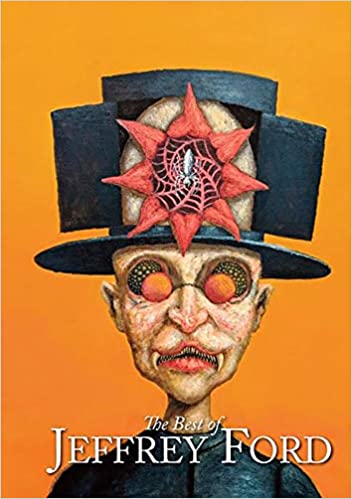THE BEST OF JEFFREY FORD

by Jeffrey Ford
PS Publishing
(www.pspublishing.co.uk)
2020, 556 pages, $23
ISBN 978-1-78636-440-1
Click here to purchase
A great single-author collection you won’t find anywhere else.
In “The Blameless,” highly skeptical witnesses to an exorcism make fun of what is going on, defying any explanation and doesn’t end the way any of the participants could have imagined.
In “Word Doll,” a strange yearly ritual involving American Indian masks and spells work together in an effort to hypnotize children into their first labors in the farm fields.
Ford definitely provides an undercurrent of scientist/creator, a definitive homage to Mary Shelley and her classic novel, FRANKENSTEIN, in several stories, including these:
“Creation.” A boy who grew up in the midst of a strong religious community (except for his atheist father) literally pieces together, from items he finds in the dark woods, a creature he names “Cavanaugh.” The creature subsequently disappears. But other people encounter the creature that, like Dr. Frankenstein’s Monster, is shy, alone and afraid, and apparently would not harm a butterfly. What is Cavanaugh’s ultimate fate?
In “Daddy Long Legs of the Enemy,” an ordinary baby boy has an invasive spider crawl into him and take over his brains, giving the boy Spiderman-like attributes, and his parents abandon the boy to live on its own far from its original home. The spider-being’s name is shortened to “Daddy,” and is trying to understand its own existence, much like Frankenstein’s Monster.
(This collection’s cover obviously depicts the creature, “Daddy.”)
But what will Daddy do in the meantime?
“The Night Whiskey.” The effects of imbibing an elixir that will put you into a coma with hallucinations and make you sleep in a tree should have some large consequences for a community.
“The Seventh Expression of the Robot General.” One artificial, battle-ready life form called the Robot General, Galaxy Corps, has seen its share of fierce combat with the deadly off-planet Harvang. The General has lead generations of soldiers. But the General is growing weary of all the accolades and some of the hatred and criticism of what he represents. Seemingly immortal, who can he convince to simply execute him?
“Blood Drive.” In a world in which the pro-gun people have their way, everybody — and I mean everybody — is packing heat. And do you think people will become less ignorant and reckless than they already are? What’s the ultimate conclusion to ultimate freedoms? The story is very wiry and wacky, as well as dire and frightening.
“Bright Morning.” A writer of fantasy bemoans the fact that critics always compare his work to the Czech writer Franz Kafka, using all appropriate clichés. The author wonders why they believe his style is the same as Kafka’s: a man who battled his own demons. But the author recalls reading a rare story of Kafka’s called “A Bright Morning,” from an even more obscure collection of Kafka. So obscure that most Kafka story collections don’t include it.
Until after many searches, a book dealer contacts the author and involves the author in a bidding war with another author, this one none other than Jeffrey Ford. Who will win the bid on the book, and what will be his fate?
“The Empire of Ice Cream.” This has always been my favorite Jeffrey Ford story and holds up on further rereading. Ford, in most of his works, can get pretty funky about reality, the nature of it, the essence of it and how, well, you just don’t know and sometimes can’t trust your own perceptions of what you experience and how reliable your reality filters are. This story centers on a boy who, while a musical genius, experiences notes as bright Crayola crayon colors. In other words, he has a condition called synthesia: wherein experiences of color, scents, sights and sounds are perceived in turnabout ways.
For instance, the sound of a car coming down the road can be the taste of cinnamon. The true scent of cinnamon can turn up as the color brown, or black for that matter. Only when he visits an ice cream parlor and eats coffee ice cream, the boy experiences what at first seems a phantasm, but coalesces into a real girl with the name, Anna. When he eats ice cream coffee — or just sips regular caffeinated coffee — he can converse and interact with Anna. The boy wonders: is she for real or just a synthesitic phantom, a muse, a dream? How can he co-exist with Anna, with whom he finds himself falling in love?
This is an engaging story and, in the end, Ford messes with our own perceptions of how this story will end.

